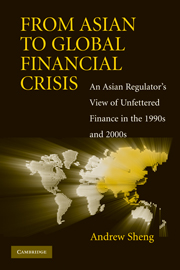 From Asian to Global Financial Crisis
From Asian to Global Financial Crisis Book contents
- Frontmatter
- Contents
- List of Figures
- List of Tables
- Acknowledgements
- Introduction
- 1 Things Fall Apart
- 2 Japan and the Asian Crisis
- 3 The Beam in Our Eyes
- 4 Banking: The Weakest Link
- 5 Washington Consensus and the IMF
- 6 Thailand: The Karma of Globalization
- 7 South Korea: Strong Body, Weak Heart
- 8 Malaysia: The Country That Went Its Own Way
- 9 Indonesia: From Economic to Political Crisis
- 10 Hong Kong: Unusual Times Need Unusual Action
- 11 China: Rise of the Dragon
- 12 From Crisis to Integration
- 13 The New World of Financial Engineering
- 14 What's Wrong with Financial Regulation?
- 15 The Global Financial Meltdown
- 16 A Crisis of Governance
- From Asian to Global Crisis: Chronology of Notable Events
- Abbreviations and Acronyms
- Bibliography
- Index
16 - A Crisis of Governance
Published online by Cambridge University Press: 05 June 2012
- Frontmatter
- Contents
- List of Figures
- List of Tables
- Acknowledgements
- Introduction
- 1 Things Fall Apart
- 2 Japan and the Asian Crisis
- 3 The Beam in Our Eyes
- 4 Banking: The Weakest Link
- 5 Washington Consensus and the IMF
- 6 Thailand: The Karma of Globalization
- 7 South Korea: Strong Body, Weak Heart
- 8 Malaysia: The Country That Went Its Own Way
- 9 Indonesia: From Economic to Political Crisis
- 10 Hong Kong: Unusual Times Need Unusual Action
- 11 China: Rise of the Dragon
- 12 From Crisis to Integration
- 13 The New World of Financial Engineering
- 14 What's Wrong with Financial Regulation?
- 15 The Global Financial Meltdown
- 16 A Crisis of Governance
- From Asian to Global Crisis: Chronology of Notable Events
- Abbreviations and Acronyms
- Bibliography
- Index
Summary
Yesterday's world order is going fast, while tomorrow's world has yet to emerge. We are not in fact facing the ‘new world order’ today's politicians so constantly invoke. Rather we are facing a new world disorder – no one can know for how long.
~ Peter DruckerWe now come to the key lessons that we can draw from the Asian and current crises.
RITES OF PASSAGE
The Asian crisis was like a drama where we can blame the actors (Asians versus foreigners), the stage (weak domestic architecture versus faulty international architecture) or the script (bad domestic policies versus wrong international medicine). What made the Asian crisis even more fascinating is that it was not a case of the collapse of failed or failing states, but the crisis of previously highly successful states.
The more I reflect on the Asian crisis, the more convinced I am that the crisis was a clash of mindsets between the political economy of domestic economies and the rise of globalization. This clash of mindsets was inevitable, as the world becomes more and more interconnected and interactive. The Asian systems of public and private governance that worked and succeeded spectacularly in the Asian Miracle period proved to be fragile and vulnerable under the shocks of global capital flows.
Similarly, more than a decade later, the global crisis erupted because no economy is now an island to itself. A chain of domestic events, each apparently harmless or benign in itself, can be catastrophic when linked globally.
- Type
- Chapter
- Information
- From Asian to Global Financial CrisisAn Asian Regulator's View of Unfettered Finance in the 1990s and 2000s, pp. 396 - 410Publisher: Cambridge University PressPrint publication year: 2009


